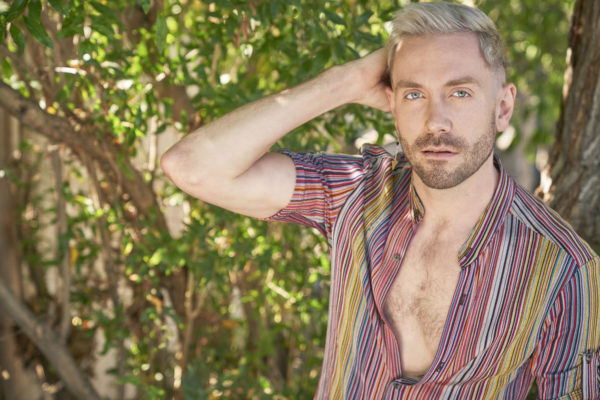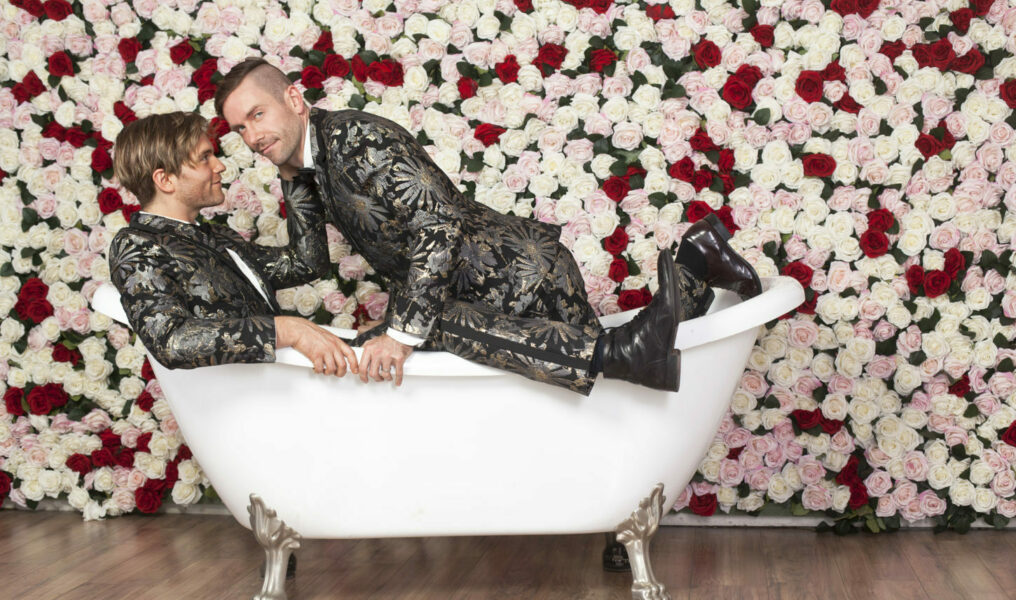It's a pretty standard dating rule: if your significant other has cheated on you, the relationship is over. And in the TV world, that's usually the way things play out.
"But what happens in the aftermath of an unforgivable offense if the couple decides to stay together? What does that look like?"
Those are the questions posed in the LGBTQ series "EastSiders" by creator Kit Williamson who introduced infidelity in the Daytime Emmy Award-nominated show's pilot. Now, seven years after its debut and three seasons in, the show's fourth and final season is set to premiere on Netflix on Dec. 1.
In addition to being a filmmaker, Williamson is a Fordham University and UCLA-trained actor who has graced TV screens in shows like "Mad Men," "The Good Wife" and "Death Valley," along with appearances on both Broadway and Off-Broadway. When asked why he chose to focus on a relationship conflict as the basis for his critically acclaimed show, Williamson said it was a natural starting point.
"I think that all drama is rooted in conflict," he said. "If there is not conflict there is no story, so I wanted to put the characters into as much conflict as possible."
Fans will know that Williamson has certainly kept his word on that throughout three seasons of "EastSiders," tackling everything from substance abuse to simply navigating life in queer circles. He also plays the part of Cal who is one half of the show's central couple Cal and Thom. And despite all of their in-show challenges, the couple has lasted throughout the show's three seasons and doesn't show signs up breaking up any time soon.
Williamson made time between flights to chat with Between The Lines about the last season of "EastSiders," how his creative process has changed since the show debuted online in 2012, it's uniquely queer love triangle and his future goals as an LGBTQ creator.
I was excited, as I'm sure our readers will be, to learn you have a Michigan tie! You attended Interlochen Arts Academy your junior and senior years.
I did, yes. And I've actually been back two times to teach. They were such formative years. I wrote my first plays at Interlochen, I discovered a love of playwriting and dialogue. I discovered a love of poetry and fiction. I met my best friend at Interlochen, Brie Cavallaro, she's a young adult novelist and she actually teaches in the creative writing faculty at Interlochen now. Interlochen has a really special place in my heart.
Now that "EastSiders" is in its final season, how would you compare your creative approach to when you were just leaving school and starting the show?
Well, first of all, we were just babies when the show started back in 2012. I was a graduate student getting my MFA in playwriting at UCLA, and I'd actually never written anything that had gotten produced before. And over the years, you can really, I think, track my personal and professional development through the show. I feel like we've really grown up with the show as artists, as people; it tracks seven years now in the life of a gay couple in Los Angeles. A bit of a tangent, but it's really rare that we get depictions of long-term LGBTQ relationships in media and stories, [and] that we get to sit with characters in long-form storytelling like that.
It's true, that depiction is rare. In 2017 you mentioned in an interview that media was entering a unique time for LGBTQ creators and stories. As a gay creator in 2019, what do you try to convey to audiences when telling those stories?
I think right now in 2019 we have a lot to tackle in terms of LGBTQ storytelling. Pretty near the top of my list is thinking about intersectionality, thinking about how stories can be represented beyond just the cis, white point of view that I was born with. So, I really respect and understand that and I tried to make season four as inclusive as possible. Another thing that I'm personally thinking more and more about is trying to tell LGBTQ stories outside the framework of respectability. We no longer need to put forth characters that are perfect and pristine and living unvarnished lives — that's not very interesting to me. And last but not least, in projects that I'm developing outside of "EastSiders," I'm thinking a lot about telling stories of LGBTQ people, queer people outside of the coastal urban centers where we tend to gather. I'm from the south, I'm from Mississippi, and I think the industry has a huge blind spot when it comes to not just queer people living in the south but anyone living in the south or rural parts of the country.

Have you seen Tig Notaro's "One Mississippi"? I think that show is a great example of that kind of media.
Tig Notaro! Yes. I get why people, particularly LGBT people living in New York are Los Angeles are telling stories about New York and Los Angeles. I certainly was, you know? Because I moved from Mississippi and it was like this whole new world opened up for me in Silver Lake, and that was a big part of what inspired me to write "EastSiders." But now that I'm a little bit older and I've lived here a little bit longer, I guess my attention is turning back toward home a little bit and my roots.
Speaking of that inspiration, what gave you the idea for it originally?
I first started thinking about what would only be possible in a queer story. And that's what gave me the idea for the love triangle between Jeremy, Cal and Thom, because I think only in a queer relationship could you go and sleep with the person that your partner cheated on you with (laughs). There's no making that equation unless at least two of the points in the triangle are queer in some way (laughs), and given the potential for attraction for all three points in the triangle, I thought that was a really interesting complication. I also really wanted to take as a jumping-off point to what happens in the aftermath of something that many would consider unforgivable infidelity.
It's true, that kind of matchup would be impossible on a straight sitcom.
We're always trying to ask ourselves, "How is the show uniquely queer?" So, what is it about this show that you can't get on network television or that you can't get on most cable television shows? I'm always trying to lean into the queerness of the show and the queerness of the characters. That's why season four centers around a drag queen's wedding and a unique kind of debate that I think you don't have outside of queer circles about masculinity and masculine versus feminine gender presentation.
This show is unique because it's been funded largely by fans since it was developed, and that has seemingly given you a lot of creative autonomy. Now that it's ending, will you miss that kind of creative freedom that you might not get in a more traditional network setup?
I actually have a Patreon right now that supports the development of other independent queer projects that I'm putting together. It's just patreon.com/kitwilliamson. I have a lot of ideas of things to do on there, but I am also simultaneously developing something that would get within a traditional network or cable pipeline. Because, ultimately, I feel like the show has grown as big as it can grow without having the full backing of a larger entity. It's great that we've been able to achieve this level of distribution given how humble the project's origins are.
I also heard that as a companion to season four you'll be releasing a documentary about how "EastSiders" was made. When will that be released?
Stay tuned (laughs)!










